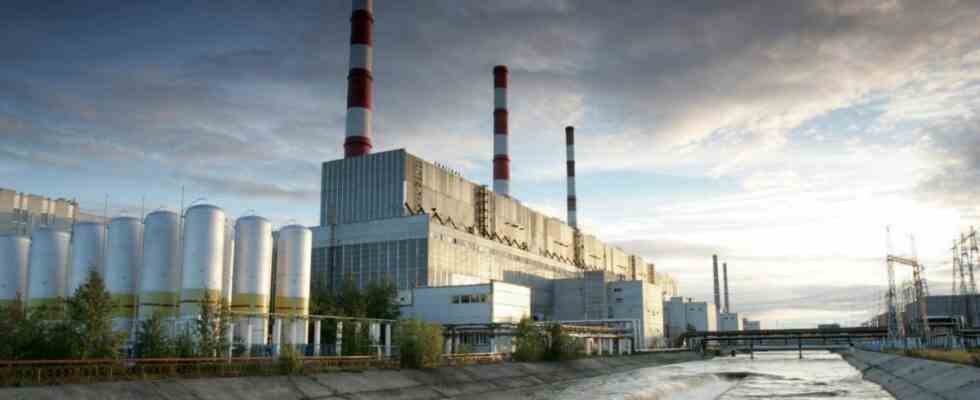If you like, Uniper has been Putin’s loyal customer up to now: the Düsseldorf-based company buys a lot of gas and coal from Russia, and they have stakes in power plants. And Uniper co-financed the Nord Stream 2 pipeline, which initially failed. It took the company all the longer to react to the war in Ukraine. But now, late Monday eveningUniper has made a four-fold turnaround.
Like large parts of politics and business, Uniper has so far relied on Russia as a reliable energy supplier. But the war in Ukraine has destroyed supposed certainties – and is now also leaving its mark on local corporate balance sheets.
Uniper writes off the value of the loan to Nord Stream 2 plus the expected interest in full. In total, almost one billion euros in equity is lost on the balance sheet. The M-Dax company had lent the project company – like four other western groups – almost 700 million euros and expected around 100 million euros in interest per year. This return will now be “eliminated”, states Uniper, a bitter loss from an economic point of view. The federal government had already suspended the approval of the new line two weeks ago. Co-financier Wintershall Dea also wrote off its loan to Nord Stream 2 last week.
In addition, Uniper holds almost 84 percent of the Unipro company, which operates five coal and gas plants in Russia and is listed on the local stock exchange. Uniper is now announcing that it will not make any new investments in Russia and will not transfer any money to Unipro until further notice. Uniper had already tried to sell the stake at the end of 2021, but stopped doing so for the time being due to political developments. The company has announced that this process will now be resumed “as soon as possible”. Of course, getting a good purchase price for the Russian subsidiary quickly is likely to be much more difficult these days.
Uniper wants to stick to existing supply contracts, but does not want to conclude any new ones
From a purely financial point of view, a separation from Unipro can certainly hurt Uniper: Last year, the power plants in Russia contributed almost 20 percent to the group profit. But the war in Ukraine overshadows everything. There is “no justification whatsoever” for the military attack, says Uniper boss Klaus-Dieter Maubach. The 59-year-old has to question a number of things: Especially because Uniper has maintained business relationships with Russia for so long, one is “shocked and moved”.
Those relationships include that Uniper imports a lot of gas; the majority has so far come from Russia. The company burns the energy source in power plants and sells it to municipal utilities or factories. Uniper wants to stick to existing contracts for the time being. You have a responsibility “for large parts of German industry and many people in Germany and Europe,” says Maubach. However, the company has announced that it will “not sign any new long-term gas supply contracts with Russia.”
At the same time, there have long been threats that Russia would throttle gas flows – or that the West could no longer import gas from Russia. Analysts see this as a major risk for several utilities in Europe. According to Uniper, it could “largely” compensate for a short-term throttling, also thanks to its own storage. But if the gas flows were significantly interrupted, the group expects an emergency in the local gas system; then the state would take control. “At this point in time, we consider the likelihood of such a restriction to be low,” says Uniper CFO Tiina Toumela. “All parties are currently committed to continuing gas deliveries.”
Datteln 4 power plant on the northern edge of the Ruhr area: Uniper wants to make its hard coal piles independent of fuel from Russia.
(Photo: Bernd Thissen/dpa)
Far away from Nord Stream, Unipro and gas trading, Uniper also operates hard coal-fired power plants in Germany, Great Britain and the Netherlands. So far, the company has also obtained some of this fuel from Russia. Uniper has announced that existing supply contracts are expected to run until the end of this year. But the company does not want to extend the contracts with Russia – and is now making sure that in future it will be possible to do without Russian coal. Uniper can also import the energy source from Colombia or South Africa, for example.
Until 2016, Uniper was a subsidiary of the Eon Group, which took it public at the time and quickly sold its remaining stake. Uniper is now majority owned by the Finnish utility Fortum.
The company has steadily increased in value on the stock exchange in recent years. But since the escalation of the Ukraine conflict, the share price has collapsed by a good half. The reversal on Monday evening now brought a certain relief: On Tuesday, Uniper temporarily gained nine percent in value on the stock exchange.
An LNG tanker on the French Atlantic coast: Liquefied natural gas is an internationally traded alternative to pipeline gas from Russia.
(Photo: Stephane Mahe/Reuters)
The company is now pulling another project out of the drawer: Uniper wants to set up an import terminal for liquefied natural gas (LNG) in Wilhelmshaven on the North Sea – as an alternative to gas from Russia. The group had planned to do this before, but canceled the plan a year and a half ago due to a lack of demand. But since the outbreak of the Ukraine war, the federal government has also spoken out in favor of two LNG terminals in Germany: RWE and the Dutch company Gasunie are planning an import port in Brunsbüttel. Now Uniper is trying to follow suit.

